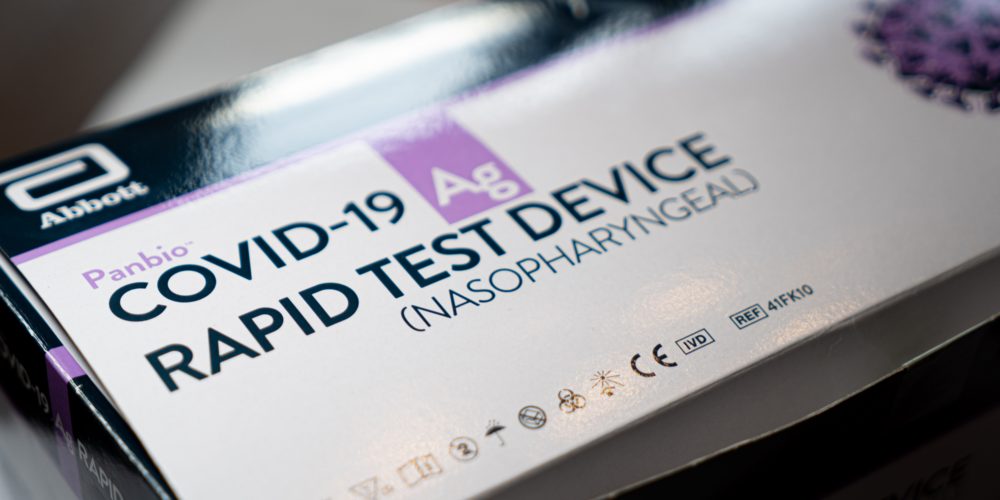
How is an Antigen Test Done?
Getting tested for COVID-19 is a process that no one wants to go through, although it is unfortunately a reality that many people need to get tested on a regular basis for the time being. From negative test results required for travel to wanting to make sure you’re doing your part to stop the spread, getting a test is something that most of us will continue to have to go through.
However, when it comes time to get one, which type of test is right for you? Should you get a COVID-19 antigen test or a PCR test? To help you understand your options, we’re taking a closer look at what antigen tests are, how they are performed, and what the difference is between an antigen test and a PCR test.
What is an antigen test?
An antigen test isn’t just for COVID-19, and in fact has been used for many years to diagnose certain types of illness. The antigen test is a type of diagnostic test that looks for the presence or absence of an antigen. Antigens are molecules or molecular structures that are sometimes on the outside of a virus. These tests are sometimes referred to as a rapid antigen test or a rapid antigen detection test. They are meant for point-of-care testing in places like hospitals or nursing homes and are often used as screening tools.
The most common applications for rapid antigen tests are:
- COVID-19 testing
- Strep (streptococcal, sometimes called strep throat) tests
- Rapid influenza tests
- Malaria antigen detection
How is an antigen test done?
An antigen test is performed by taking a sample of mucus from your nose or throat with a cotton swab. You may have some slight discomfort, but taking the sample only takes 10-20 seconds. That sample is then put into a device that contains a solution with certain ingredients and after waiting for ten minutes, it will create a certain reaction if the antigen is present or absent. As you can see from the following chart, the test administrator is able to give a result based on what lines appear:

Source: U.S. Food and Drug Administration (FDA)
The whole process boils down to:
- Nose or throat is swabbed
- Sample is placed in rapid testing device
- 10-15 minute wait time (can vary depending on the device used)
- Test administrator reads the results
What is an antigen test for covid?
Rapid antigen tests are now one of the most familiar applications of this process. As discussed earlier, antigen testing is a type of test process that can be applied to different viruses. With the COVID-19 pandemic, this testing process was applied to the SARS-CoV-2 virus as it is a quick and easy tool when trying to test a large number of people.
What is the difference between a COVID19 antigen test and a PCR test?
When comparing the antigen test vs PCR, the most important thing to note is the difference in what they are looking for. The antigen test detects the presence of antigens, a molecule on the outside of the virus. The PCR tests look for the presence of the actual DNA of the virus through a testing process that converts the RNA of the virus into DNA and amplifies it so the DNA can be detected.
How accurate is a covid19 antigen test?
COVID-19 antigen test accuracy varies in sensitivity. A group of scientists at Cochrane looked at many different antigen testing studies and found that in people with confirmed COVID-19, antigen tests correctly identified COVID-19 infection in an average of 72% of people with symptoms, compared to 58% of people without symptoms. Tests were most accurate when used in the first week after symptoms first developed, most likely because the viral load (the amount of the virus in your system) is highest during the first few days after infection. In people who did not have COVID-19, antigen tests correctly ruled out infection in 99.5% of people with symptoms and 98.9% of people without symptoms.
According to the FDA, antigen tests are specific for the virus, but not as sensitive as PCR tests. This means that there is a higher chance of false negatives, so negative results do not necessarily rule out an active infection. Confirming a negative antigen test result with a PCR test is considered best practice to prevent possible spread of COVID-19.
Fast, accurate testing with BioCollections
With over 20 years of experience developing and delivering quick and accurate testing, BioCollections understands the importance of reliable test results. BioCollections has locations in Miami, Tampa, Orlando, Los Angeles, Las Vegas, and Puerto Rico. Our international affiliates and subsidiaries are located in Central America, South America, Europe, Africa, and Asia.
As the first lab to provide COVID-19 testing in Florida, we have now performed over 300,000 SARS-CoV-2 tests using the gold standard of testing, the RT-PCR process. Our current turnaround time for PCR test results is only 12 hours, giving you the accurate results in a faster time frame.
In addition to individual testing, we offer employer testing solutions with turnkey support like offsite or onsite visits, texted notification of results, and HIPAA-compliant tools to view results.
Visit our website to learn more about our testing solutions, or contact us with questions.

Obviously, it is not accurate since the COVID virus has never been isolated.
Hey There. I found your blog using msn. This is a really well written article. I will be sure to bookmark it and return to read more of your useful information. Thanks for the post. I will definitely comeback.